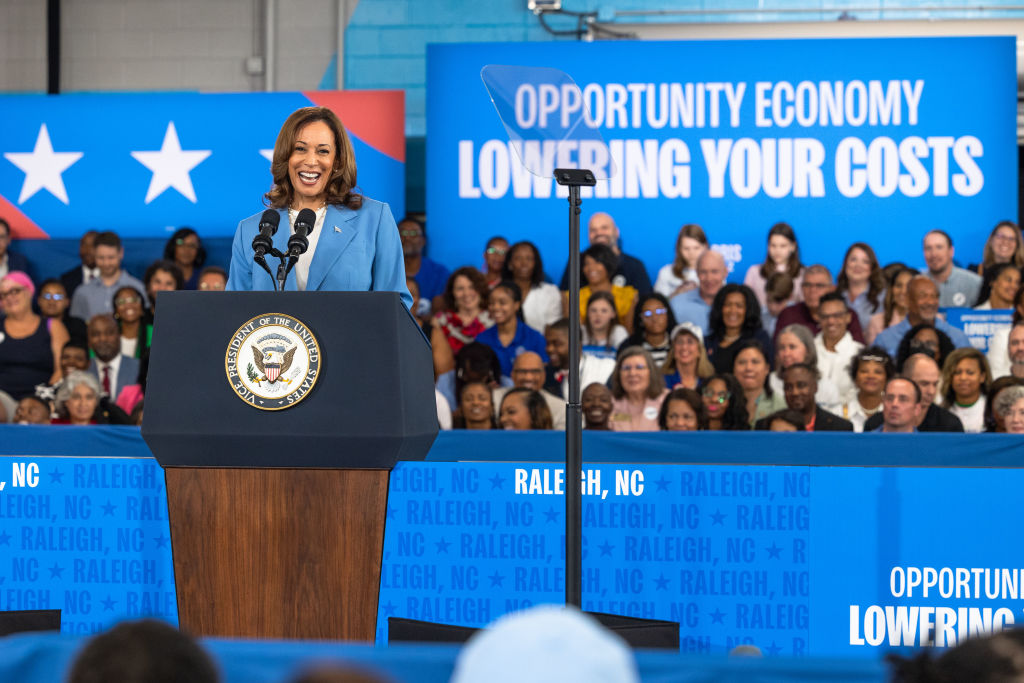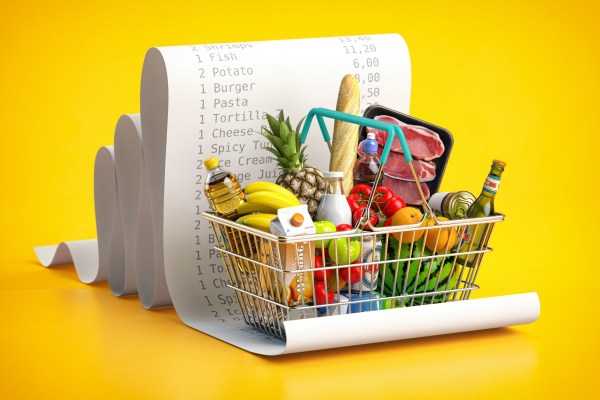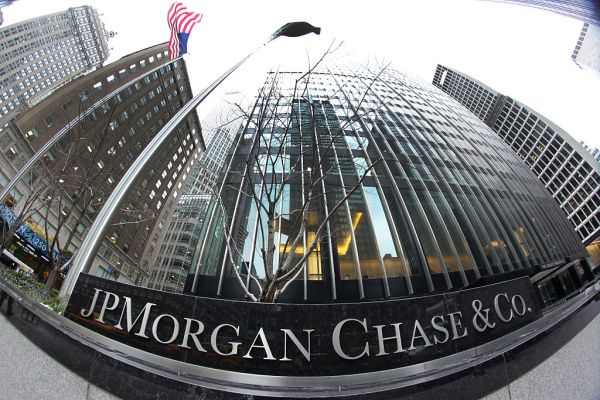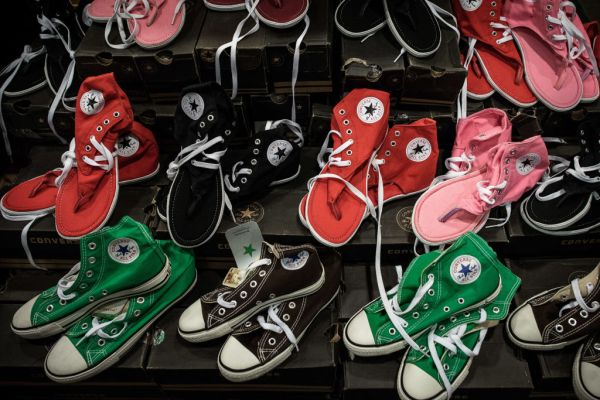Support for Donald Trump has arguably always been fueled by nostalgia. During his first run for president, he drew in supporters longing for the bygone era of the postwar boom. This time around, his promises to end inflation appeal to nostalgia for a much more recent era: the mid-to-late 2010s.
That was a great time to be a consumer. The gig economy let us order cheap private taxis, and we could go to the movies as often as we wanted for $9.99 per month. Or we could stay home, have a cheap taxi bring us burritos, and watch all the movies and TV shows we wanted for $9.99 a month on Netflix.
Then, it all went away. The cheap Ubers and streaming services were never going to last, because these companies were barely if at all profitable, using artificially low prices to rapidly gain market share. But the coronavirus pandemic led to disrupted supply chains and stimulus checks that combined to drive up inflation, which in turn saw the low interest rates on borrowing that had fueled so much of the economic growth of the 2010s disappear, as central banks around the world raised rates to keep prices stable. Consumers don’t understand why the good times had to end, but many of them associate those good times with Trump, and, much like a cargo cult building landing strips out of sticks and hay in the hopes that the magical metal birds will bring them more supplies, they hope that by reelecting Trump, they can get those low rates and prices back.
That won’t work, of course. But voters have good reason to be confused: Nobody has been honest with them about why inflation happened. The truth is, it was all very predictable, and some advance warning could have helped people prepare.
How we got here.
When the pandemic struck, supply chains were disrupted at the same time that governments were injecting more money into the economy to keep it afloat. More dollars chasing fewer goods naturally leads to inflation.
When the U.S. and most of the rest of the developed world decided to lock down, economic turmoil and inflation were a given. This does not mean that lockdowns were a mistake, but rather that, like all government policies, they involved trade-offs. Policymakers could have and should have made the case that inflation was an inevitable and justifiable side effect of efforts to save potentially hundreds of thousands of lives. Whether or not voters accepted that, they would have at least been warned.
Nobody wants to be the politician who, in the style of Winston Churchill, proclaims that they have nothing to offer but blood, sweat, toil and $12 Subway footlongs.
Given that supply chain disruptions and stimulus packages guaranteed inflation, rising interest rates were also predictable. When inflation rises above its target, the Federal Reserve will always raise rates to make it cool down. Policymakers could have explained that the economic consequences of a global pandemic would be felt for years even after the public health crisis had subsided.
But if inflation was predictable, why did politicians claim that it was not? Why, for such a long time, was it supposedly “transitory” at worst, non-existent at best? Part of the answer lies in Keynesianism, an economic school of thought that emphasizes the need to manage expectations and keep consumer confidence up.
Politicians schooled in this thinking tend to reason that if you tell people that something bad is going to happen, they may panic, and the bad thing will get even worse than it would have been. Or worse, you may end up making a bad thing happen when it otherwise wouldn’t have, like a self-fulfilling prophecy. Tell consumers that inflation is coming, and they may run to the stores and stock up before prices can rise, and this sudden glut of demand will then make inflation worse, and even potentially cause shortages (such as the infamous toilet paper shortage of spring 2020).
These concerns may not be completely unjustified, but dishonesty is still a bad idea. Many consumers have lost trust in these policymakers who never seem to see any crisis coming, including this recent bout of inflation, something that makes them appear incompetent. Other consumers, meanwhile, figured out that policymakers did know what was coming and did not tell them. Both these points serve to fuel populism by causing a decline of trust in policymakers.
Furthermore, interest rates had been low for a decade, and inflation had not been a serious concern since the 1980s, long before many voters were adults or even born. And so for many, inflation felt like it came out of nowhere, an impression strengthened by policymakers who pretended to be equally surprised. Whenever something bad happens that the public has not mentally braced for, a portion will turn to conspiracy peddlers and extremists for answers. Uncertainty over where inflation came from and the impression that policymakers are clueless understandably leads voters to be skeptical when those same policymakers claim that they know for certain that inflation is now over. This, again, is a gift for those political forces whose strength depends on distrust in the mainstream.
If President Joe Biden and Vice President Kamala Harris had admitted when they took office that inflation would be a serious issue throughout their term, they also could have explained why the Federal Reserve had to raise rates. Instead, they to this very day pretend that inflation was caused by a surge in “corporate greed” that came presumably out of nowhere. No reasonable explanation has been offered for why an equivalent or greater surge in greed didn’t occur during the far more pro-business presidency of Donald Trump.
Blaming “greedy corporations” for inflation leaves consumers wondering why they have to pay higher mortgage rates in addition to paying more for groceries and gas. Why can’t the politicians just stop those greedy fat cats instead? And why did Donald Trump never have this problem? Having tied herself to this mast, Harris responded by proposing price controls on groceries to keep her “corporate greed caused inflation” narrative straight.
At the same time, the “corporate greed” lie has left the administration defenseless against the claim that its own profligate spending caused inflation. While it’s true that spending did not help, and arguably made things worse, comparing the U.S. inflation rate to any other major developed economy reveals aggregate inflation in the United States to be at virtually the same level as the Eurozone and the U.K. since 2021. Meanwhile, the U.S. has experienced faster economic growth than those economies during that time.
The “corporate greed” narrative becomes weaker when it becomes clear that inflation happened everywhere across the developed world. Did policymakers everywhere, even in social democratic countries like those in Scandinavia, just allow businesses to get away with spontaneous, unlimited greed? Had the administration been honest, it could have brought up the aforementioned international inflation rates to make a positive case that, really, it could have been worse, and that it’s absurd to claim that Biden’s policies caused a wave of inflation that has swept over the entire developed world. To make that case, though, they would have to admit that inflation was a predictable consequence of the pandemic that they failed to warn voters about.
This is not a one-off thing, nor is it specific for Democrats. Nobody wants to be the politician who, in the style of Winston Churchill, proclaims that they have nothing to offer but blood, sweat, toil, and $12 Subway footlongs. All the talk about “15 days to slow the spread” and similar rhetoric was also overly optimistic, and everyone knew it. Before that, in the run-up to the 2008 financial crisis, few if any politicians dared to talk about the rapidly deflating housing bubble and the disaster that they may not have known was coming, but which they certainly knew was possible.
While in the short term, the rationale behind always keeping expectations up makes sense, in the long run, it has a deteriorating effect on society and institutional trust. Trust is a two-way street, and American politicians who want people to trust them again, should also dare to trust the people with the truth.
More honesty about inflation four years ago would have given the Democrats tools to counter Donald Trump’s claims that he will lower prices and end inflation. Instead of tying herself into knots with crazy price control policies, Harris could have focused her fire on Trump’s inflation-reviving tariff proposal.
Where do we go from here?
At this point, the only way to restore trust is, in my view, to break the rules of political communication. Donald Trump did, and he was seen as refreshing because of his unorthodox way of speaking, a way that made him come off as honest and telling-it-as-it-is (he isn’t and he wasn’t, but that’s a different matter).
What we need now is a Domino’s ad.
In 2010, Domino’s Pizza launched an ad campaign to admit one thing: Their pizza sucked. The ad described in detail how the only thing good about Domino’s was the fast delivery. Their tomato sauce tasted like ketchup, the cheese was plastic, and the crust bore an uncanny resemblance to cardboard. What kind of way to win customers was that? Well, the ad concluded with Dominos employees and executives acknowledging the criticism and saying that it drove them to do better.
The campaign went viral for its honesty and originality, and it worked. Domino’s market share grew.
A political equivalent would be a 30-, maximum 60-second ad of a politician looking straight into the camera and sharing some very hard facts, and some sincere mea culpas. That kind of ad might truly break American politics. No flashy graphics, no swelling dramatic score, just the honest truth, spoken by politicians breaking the fourth wall and addressing the American people as if they were adults who could be reasoned with. There is an almost endless number of topics one could cover (inflation, entitlements, and business cycles being arguably the top three), and politicians on both sides should partake. It is time to stop deceiving, own up to past deceptions, and start educating.
It won’t happen during the campaign, but that’s fine. This kind of “brutal honesty ad” will be just as necessary outside of election seasons, regardless of the outcome in November. To argue that the public must be consistently lied to and deceived in order to be effectively governed is to argue against democracy, and this line of reasoning is at least as great a threat to democracy as any idea championed by Donald Trump. Policymakers on both sides wishing to turn the tide against populism should instead take a leaf out of Domino’s playbook.









Please note that we at The Dispatch hold ourselves, our work, and our commenters to a higher standard than other places on the internet. We welcome comments that foster genuine debate or discussion—including comments critical of us or our work—but responses that include ad hominem attacks on fellow Dispatch members or are intended to stoke fear and anger may be moderated.
With your membership, you only have the ability to comment on The Morning Dispatch articles. Consider upgrading to join the conversation everywhere.